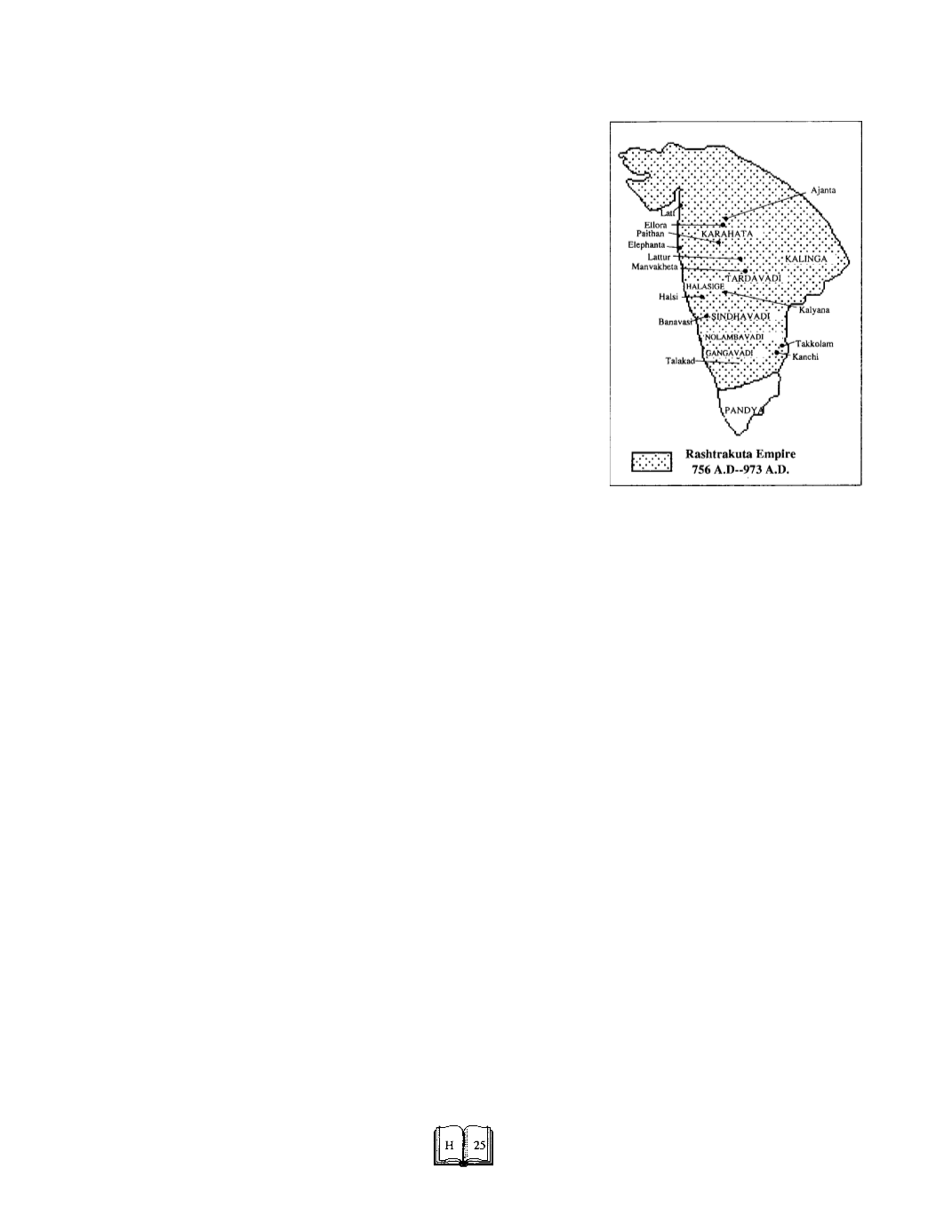

Eternal India
encyclopedia
LURE - THRU THE AGES
Overview
*
Towards the end of the 8th century, the
Guijara Pratiharas in the North, the Rash-
trakutas in the Deccan and Pal as in Bengal
began three-cornered struggle for para-
mountcy.
*
The Rashtrakutas' empire extended from
the Narmada valley (north), Mahanadi
delta (east) and Kaveri (south).
*
Malkhed or Manyakheta was their capital
(originally they came from Lattur or Lat-
talur).
*
Dantidurga, Govinda II, Dhruva I, Gov-
inda III, Amoghavarsha Nrupatunga were
the most notable rulers.
*
They won brilliant victories over the Gan-
gas, Pallavas, Chalukyas, Malwas, Par-
amaras, Prathiharas.
*
Magnificent temples were built at Ellora,
Elephanta and Malkhed; the most notable
one is the Kailasanatha temple (the Rock-
cut-monolith) at Ellora built by Rashtra-
kuta Krishna I.
*
Inscriptions are the mainstay for the histo-
rians to study the history of Rastrakutas -
Kavirajamarga
- a Kannada work written
by Nrupatunga is also helpful.
Advent
*
The Rashtrakutas started as feudatories
of Chalukyas of Badami. Later they over-
threw them and became the masters of the
whole Deccan (Mid. 8th century).
*
In 753 A.D. Rashtrakuta Dantidurga de-
feated the Chalukyas, captured Badami
and established Rashtrakuta dynasty (the
Ellora record of Dantidurga).
Chronology
*
Dantivarma
(650-665)
*
Indra I and Govinda I
(665-700)
*
Karka I
(700-715)
*
Indra II
(715-735)
*
Dantidurga
(735-755)
*
Krishna I
(755-772)
* Govinda II
(772-780)
* Dhruva
(780-793)
*
Govinda III
(793-814)
* Nrupatunga Amoghavarsha I
(814-880)
* Krishna II
(880-914)
* Indra III
(914-928)
* Amoghavarsha II
(928-929)
* Govinda IV
(929-936)
* Amoghavarsha III
(936-939)
* Krishna III
(939-967)
RASHTRAKUTAS 756-973 A.D.
*
Kottiga
(967-972)
*
Karka II (Nirupama) (972-973)
Wars
*
The defeat of Kirtivarman II, the Cha-
lukyan king, by Dantidurga at Khandesh
(758 A.D.).
*
Invasion of Yengi (770) and the defeat
of Chalukya Vishnuvardhana IV by
prince Govinda.
*
Defeat of Vatsaraja (the Prathihara
ruler of Ujjain); invasion of Gangetic
doab, and march against Dharmapala by
Dhruva.
*
Govinda III acquired Gujarat, Kosala,
parts of Andhra and Gangavadi.
*
Ganga revolt (818-820) during the reign
of Amoghavarsha, defeat of Chalukyas
at Vingavalli.
*
Indra III captured Kanauj, controlled by
Gurjara - Prathiharas and defeated
Chalukya Bhima.
*
Krishna HI invaded the territory of Gurjara-
Prathiharas, captured Chitrakuta and Ka-
linjara.
Amoghavarsha Nrupatunga I 814-880
Amoghavarsha I was born at Sribhavan
(Sanjan plates 871 A.D.); put down early
revolt, defeated Ganga rulers (Rachamalla, Sri
Varma II); defeated Chalukyas severely at
Vingavalli; and Chankarangana the Kalachuri
feudatory and captured Elichpur; defeated
Alupa prince Vimaladitya (c. 850); later de-
veloped friendly relations with Gangas, Cha-
lukyas and Pallavas; his Nilagunda records
claim that he was being worshipped by the
rulers of Vanga, Anga, Magadha, Malwa and
Vengi; built a new capital at Malkhed (Mayurk-
handi, old); a great scholar and patron of art,
architecture and literature; wrote
Kaviraja-
marga
in Kannada and
Prashnottara Ratna-
mala
in Sanskrit; he had titles like,
Nrupatunga,
Atishayadhavah,
Veeranarayana,
Kattam-
arthanda
and
Srivallabha.
His empire was di-
vided into 16 provinces (Sanjan plates 871).
He ruled till 878.
Friends
: Feudatories
Foes
: Gangas, Chalukyas, Cholas, Palas
and Gurjara- Pratiharas.
Administration
*
Kingship was hereditary.
*
Mahasandhivigrahi
was the Chief Minis-
ter for war and peace; ministers were
well versed in
Rajaneethi
(Political sci-
ence).
*
The empire was divided into
mandalas
or
rastras, vishayas
or districts; village
headman was
Gavunda;
village assem-
blies were called
Mahajana;\
taxes were
called variously as
udranga, uparika
and
bhagakara
; land revenue was collected in
3 instalments.
*
Coins like
suvarna, drammas, kalanju,
gadyanaka, kasu, manjati, akkam
etc were
issued.
*
The glorious reign of the Rashtrakutas
saw at once the flowering of literary ac-
tivities both in Kannada and Sanskrit;
Somadeva
mn-Yashastilaka champu
and
Neetivakayamrita
(Sanskrit),
Visvarupa-
Balakrida;
Jinasena and Virasena-Jain
Theologists.
*
Mainly Vedic religion was followed; Bud-
dhism and Jainism also existed. Islam was
popular on Konkan coast.
*
The temple of Kailasa at Ellora is the most
important construction of their period; the
Rockcut-temple at Elephanta is also fa-
mous.
Decline
During the period of Kottiga, the Rashtra-
kuta power began to decline. The Rashtra-
kutas were overthrown in the cyclic year,
Srimukha corresponding to A.D. 973-74
and the rule of Chalukyas of Kalyana be-
gan. (Gadag record of Chalukya Vikrama
VI).
















